Unit 5 Humans and Nature Lesson 2 Professional Rescue Team 课件(共31张,内嵌音视频)-高中英语北师大版(2019)必修第二册(共32页PP
文档属性
| 名称 | Unit 5 Humans and Nature Lesson 2 Professional Rescue Team 课件(共31张,内嵌音视频)-高中英语北师大版(2019)必修第二册(共32页PP | 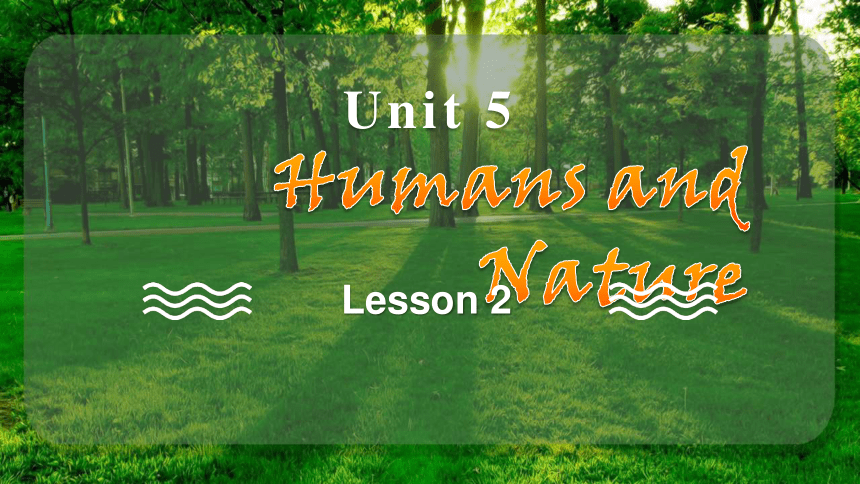 | |
| 格式 | pptx | ||
| 文件大小 | 66.6MB | ||
| 资源类型 | 教案 | ||
| 版本资源 | 北师大版(2019) | ||
| 科目 | 英语 | ||
| 更新时间 | 2025-08-01 11:01:03 | ||
图片预览

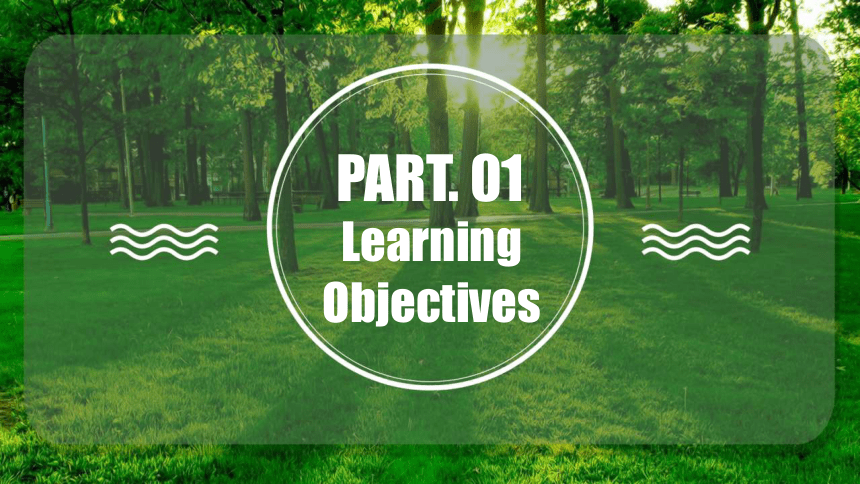
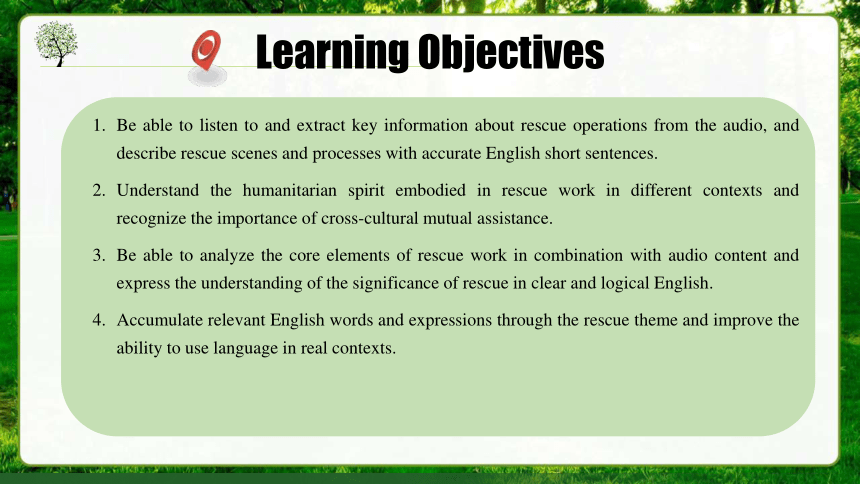
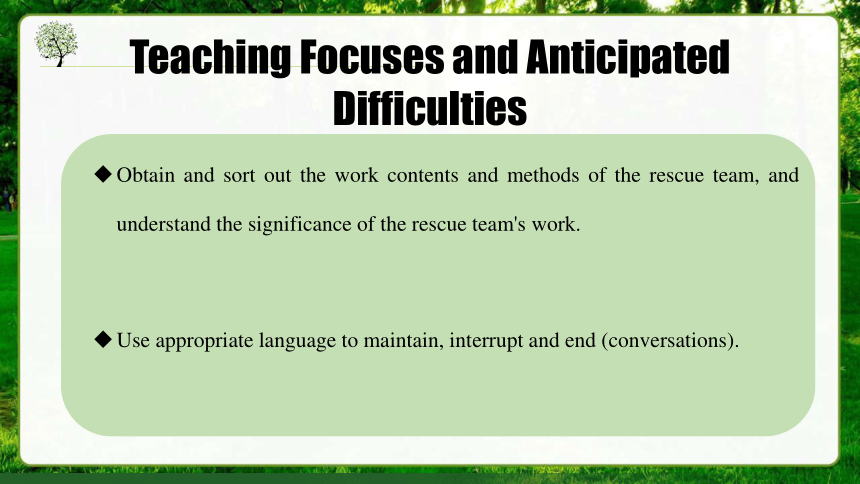

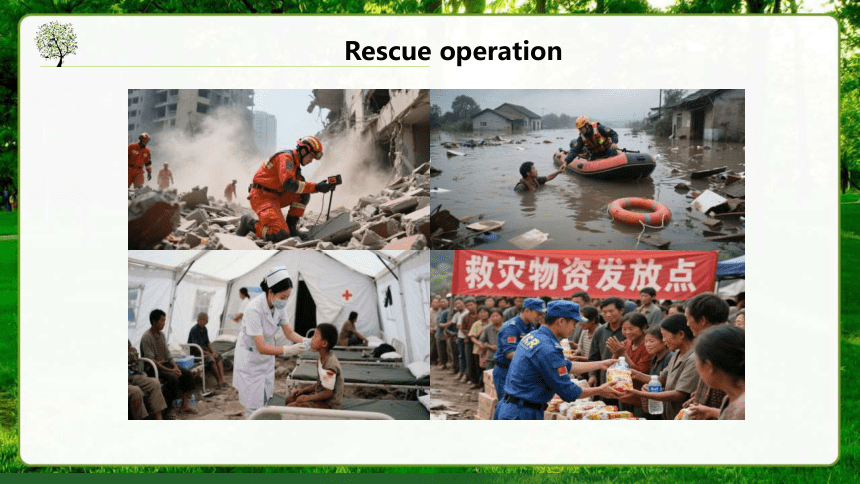
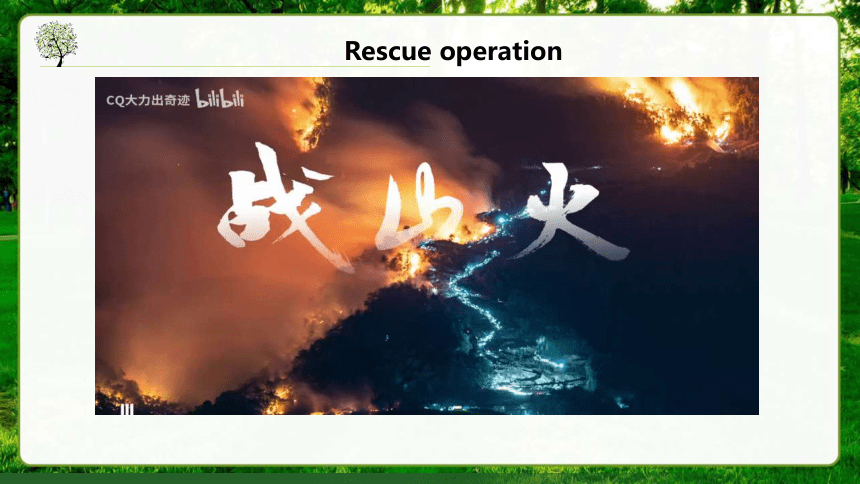
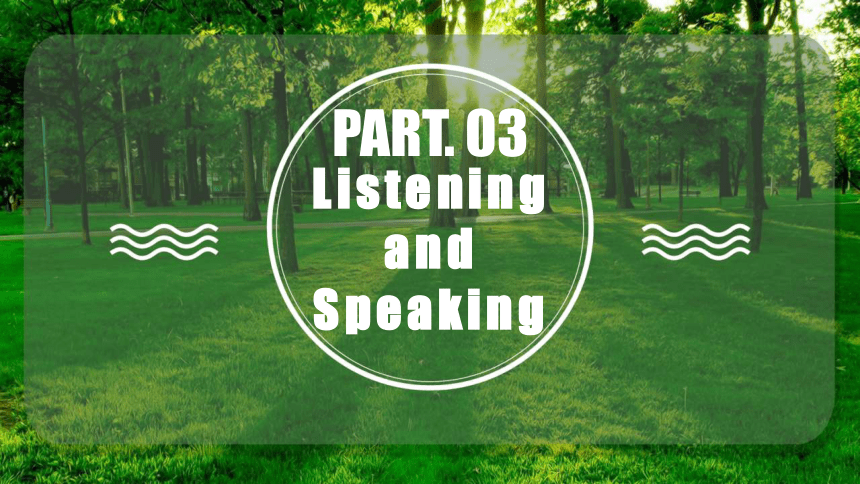
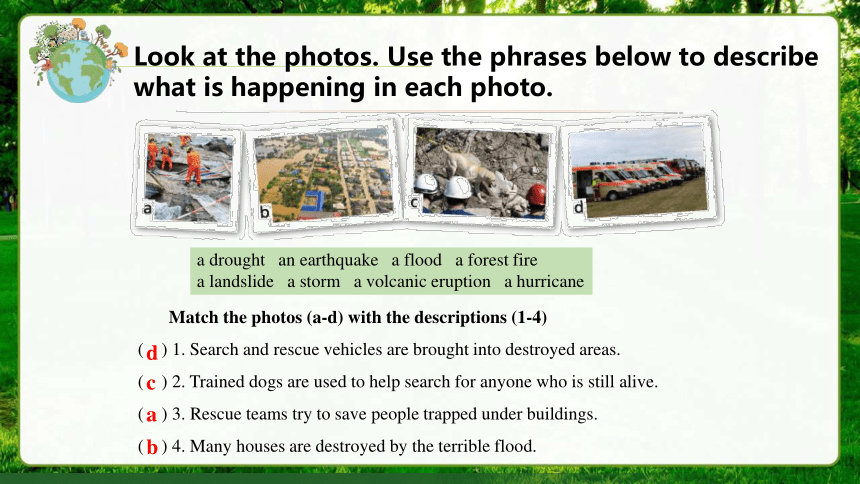
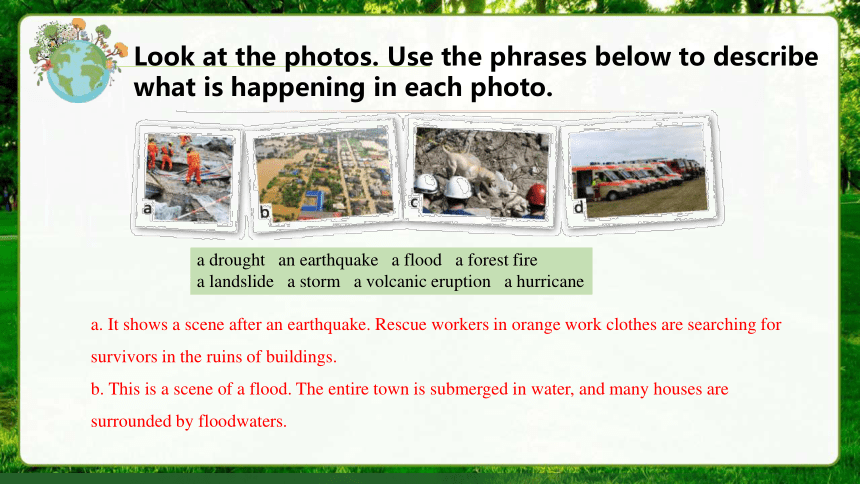
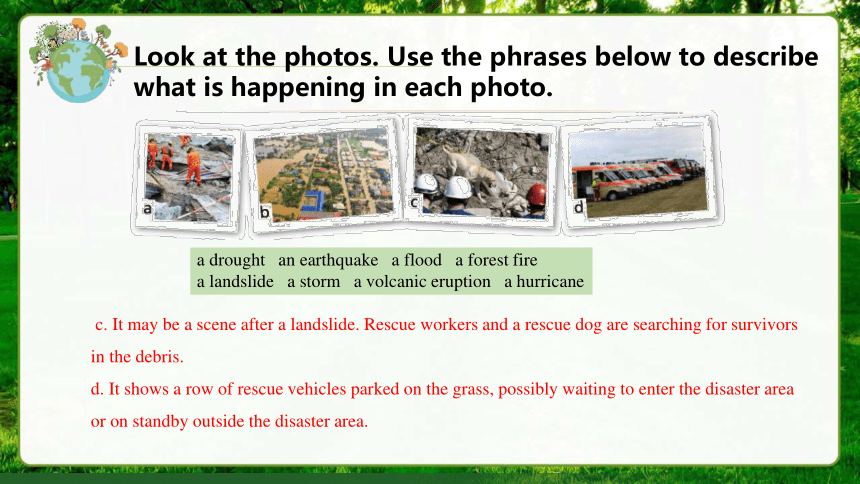
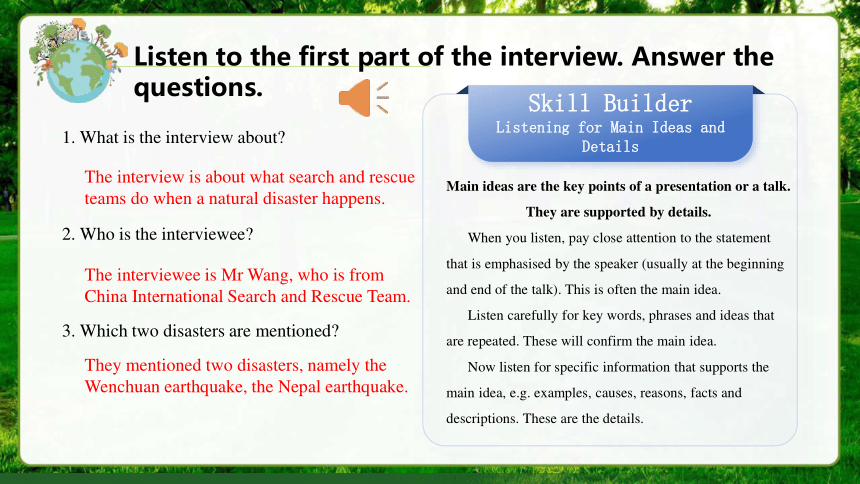
文档简介
(共31张PPT)
Humans and Nature
Unit 5
Lesson 2
PART. 01
Learning Objectives
Learning Objectives
Be able to listen to and extract key information about rescue operations from the audio, and describe rescue scenes and processes with accurate English short sentences.
Understand the humanitarian spirit embodied in rescue work in different contexts and recognize the importance of cross-cultural mutual assistance.
Be able to analyze the core elements of rescue work in combination with audio content and express the understanding of the significance of rescue in clear and logical English.
Accumulate relevant English words and expressions through the rescue theme and improve the ability to use language in real contexts.
Teaching Focuses and Anticipated Difficulties
Obtain and sort out the work contents and methods of the rescue team, and understand the significance of the rescue team's work.
Use appropriate language to maintain, interrupt and end (conversations).
PART. 02
Lead-in
Rescue operation
Rescue operation
PART. 03
Listening and Speaking
Look at the photos. Use the phrases below to describe what is happening in each photo.
( ) 1. Search and rescue vehicles are brought into destroyed areas.
( ) 2. Trained dogs are used to help search for anyone who is still alive.
( ) 3. Rescue teams try to save people trapped under buildings.
( ) 4. Many houses are destroyed by the terrible flood.
a drought an earthquake a flood a forest fire
a landslide a storm a volcanic eruption a hurricane
Match the photos (a-d) with the descriptions (1-4)
d
c
a
b
Look at the photos. Use the phrases below to describe what is happening in each photo.
a drought an earthquake a flood a forest fire
a landslide a storm a volcanic eruption a hurricane
a. It shows a scene after an earthquake. Rescue workers in orange work clothes are searching for survivors in the ruins of buildings.
b. This is a scene of a flood. The entire town is submerged in water, and many houses are surrounded by floodwaters.
Look at the photos. Use the phrases below to describe what is happening in each photo.
a drought an earthquake a flood a forest fire
a landslide a storm a volcanic eruption a hurricane
c. It may be a scene after a landslide. Rescue workers and a rescue dog are searching for survivors in the debris.
d. It shows a row of rescue vehicles parked on the grass, possibly waiting to enter the disaster area or on standby outside the disaster area.
Listen to the first part of the interview. Answer the questions.
1. What is the interview about
2. Who is the interviewee
3. Which two disasters are mentioned
Skill Builder
Listening for Main Ideas and Details
Main ideas are the key points of a presentation or a talk. They are supported by details.
When you listen, pay close attention to the statement that is emphasised by the speaker (usually at the beginning and end of the talk). This is often the main idea.
Listen carefully for key words, phrases and ideas that are repeated. These will confirm the main idea.
Now listen for specific information that supports the main idea, e.g. examples, causes, reasons, facts and descriptions. These are the details.
The interview is about what search and rescue
teams do when a natural disaster happens.
The interviewee is Mr Wang, who is from China International Search and Rescue Team.
They mentioned two disasters, namely the Wenchuan earthquake, the Nepal earthquake.
Listen again. Complete the sentences. Then decide if the sentences contain a main idea (M) about rescue attempts or a detail (D). Write the correct letters in the brackets.
What happens in rescue attempts
1. Our first and most important goal is to ____________. ( )
2. We use ______________ vehicles and __________ to look for anyone who is still alive. ( )
3. In a rescue attempt during the Nepal earthquake:
Over ______ members and ______ dogs took part, and we were there for ______ days. ( )
We rescued ______ people and provided medical help to over ______ people. ( )
4. It's our duty to try to reduce ________ and ____________. ( )
save lives
MI
search and rescue
trained dogs
D
sixty
six
twelve
D
two
2,000
D
suffering
the loss of life
MI
Pair Work. Work out four questions you may ask according to the information in the previous question. Then ask and answer the questions.
1. What is the main idea of the presentation about rescue attempts
The main idea is that rescue teams have clear goals, use various resources, and make great efforts to save lives and reduce losses during rescue attempts.
2. What details are mentioned about the rescue attempt during the Nepal earthquake
Over a certain number of members and dogs took part, they were there for several days, rescued some people and provided medical help to over a certain number of people.
3. What is the first and most important goal in rescue attempts
The first and most important goal is to save lives.
4. What vehicles and tools are used in rescue attempts to look for survivors
Special rescue vehicles and trained dogs are used.
Listen to the second part of the interview. What advice does Mr Wang give about surviving an earthquake when you're outdoors, indoors or trapped
Outdoors Indoors Trapped
____________________ from any buildings or streetlights. ______________ anything that can break or fall. ________________ to help people find you and __________ when someone is nearby.
Stay there and move away
Stay away from
Knock on a wall
only shout
Listen and imitate. Decide whether the phrases in italics are used to: maintain (M), interrupt (I) or end (E) a conversation. Write the correct letter in the brackets.
Maintaining, Interrupting and Ending a Conversation
1. Excuse me, Mr Wang, but can I interrupt you there ( )
2. OK, if I'm outdoors, ... ( )
3. Sorry, but my advice is to ... ( )
4. Sorry for interrupting again... ( )
5. Well, I'd love to know more, but, unfortunately, we've run out of time. ( )
6. So, I'm very sorry, but we'll have to finish there. ( )
I
M
I
I
E
E
What are polite ways to interrupt and end a conversation Can you find more expressions Write them below.
Polite ways to interrupt a conversation:
Excuse me, may I just add something here
Sorry to cut in, but I wonder if you could clarify that point
If I may interrupt briefly, I have a quick question about that.
Pardon me for chiming in, but I think this relates to what we discussed earlier.
What are polite ways to interrupt and end a conversation Can you find more expressions Write them below.
Polite ways to end a conversation:
It’s been great talking to you, but I should probably get going now—I have a meeting to attend.
I really enjoyed our chat, but I need to wrap this up as I have another commitment coming up.
Thanks for sharing that! Unfortunately, I have to leave soon, but let’s continue this another time.
I hate to end this, but I’m afraid I’m out of time. It was lovely speaking with you!
Pair Work. Practise maintaining, interrupting and ending a conversation in the following situations. Use the expressions in the Talk Builder to help you.
Situation 1: Two friends talking on the phone
Friend 1: talking about his / her worries for the next day's presentation
Friend 2: needs to end the conversation so as to catch a train
Situation 2: An English teacher and a student in an English class
English teacher: explaining how to use relative clauses
Student: needs to interrupt so as to ask a question
interruption n.中断;干扰;打扰
interruptive adj.中断的;打扰的
interruptively adv.中断地;打扰地
例题:
Please don't ___________ me when I'm speaking.
Vocabulary
1. interrupt
interrupt
interrupt sb 打断某人
interrupt a conversation 打断一场谈话
Vocabulary
2. conduct
conduction n.传导;导热 / 导电(物理学术语)
conductor n.导体;指挥家;列车长
conductive adj.有传导性的;有助于… 的
conductivity n. [物理] 传导性;导电率 / 导热率
例题:
He ___________ the experiment carefully, and his conduct was praised by the team.
conducted
Vocabulary
3. damage
damaged adj.受损的;被毁坏的
damaging adj.有破坏性的;有害的
damages n. [法律] 赔偿金;损害赔偿
damagingly adv.有破坏性地;有害地
例题:
The flood ___________ the crops, and farmers plan to claim damages.
damaged
Vocabulary
4. protection
protect v.保护;防护
protective adj.保护的;防护的;有保护欲的
protector n.保护者;防护物
protectively adv.保护性地;防护地
例题:
We must ___________ the environment for future generations.
protect
PART. 04
Exercise
Exercise: Word spelling.
1. The rescue team made a brave a______________ to save the people trapped in the earthquake - hit area.
2. It is impolite to i______________ others when they are speaking.
3. The terrible accident caused a great l______________ of life and property.
4. The doctor will perform an o______________ on the patient tomorrow morning.
5. We should take proper m______________ to prevent the spread of the disease.
ttempt
nterrupt
oss
peration
easures
Exercise: Fill in the blanks with the appropriate forms of the given words.
1. The heavy snowstorm __________(trap) many drivers in the mountain pass, and rescue teams are trying their best to help them.
2. The company suffered a huge financial __________(loss) due to the global economic crisis, which led to the layoff of many employees.
3. Before starting the construction project, engineers need to __________(measure) the land carefully to ensure the accuracy of the design.
4. After running for a long time, he stopped to __________(breathe) deeply, trying to calm his racing heart.
trapped
loss
measure
breath
PART. 05
Summary
添加标题
ADD THE TITLE HERE
Lesson 2
Vocabulary
The work content, methods of the rescue team.
The significance of rescue work.
listening
interrupt, conduct, damage, protection
PART. 06
Homework
Homework
Using the knowledge we've learned, have a conversation with your classmates to briefly describe the audio you heard, and end the conversation with appropriate language.
See you next class!
Humans and Nature
Unit 5
Lesson 2
PART. 01
Learning Objectives
Learning Objectives
Be able to listen to and extract key information about rescue operations from the audio, and describe rescue scenes and processes with accurate English short sentences.
Understand the humanitarian spirit embodied in rescue work in different contexts and recognize the importance of cross-cultural mutual assistance.
Be able to analyze the core elements of rescue work in combination with audio content and express the understanding of the significance of rescue in clear and logical English.
Accumulate relevant English words and expressions through the rescue theme and improve the ability to use language in real contexts.
Teaching Focuses and Anticipated Difficulties
Obtain and sort out the work contents and methods of the rescue team, and understand the significance of the rescue team's work.
Use appropriate language to maintain, interrupt and end (conversations).
PART. 02
Lead-in
Rescue operation
Rescue operation
PART. 03
Listening and Speaking
Look at the photos. Use the phrases below to describe what is happening in each photo.
( ) 1. Search and rescue vehicles are brought into destroyed areas.
( ) 2. Trained dogs are used to help search for anyone who is still alive.
( ) 3. Rescue teams try to save people trapped under buildings.
( ) 4. Many houses are destroyed by the terrible flood.
a drought an earthquake a flood a forest fire
a landslide a storm a volcanic eruption a hurricane
Match the photos (a-d) with the descriptions (1-4)
d
c
a
b
Look at the photos. Use the phrases below to describe what is happening in each photo.
a drought an earthquake a flood a forest fire
a landslide a storm a volcanic eruption a hurricane
a. It shows a scene after an earthquake. Rescue workers in orange work clothes are searching for survivors in the ruins of buildings.
b. This is a scene of a flood. The entire town is submerged in water, and many houses are surrounded by floodwaters.
Look at the photos. Use the phrases below to describe what is happening in each photo.
a drought an earthquake a flood a forest fire
a landslide a storm a volcanic eruption a hurricane
c. It may be a scene after a landslide. Rescue workers and a rescue dog are searching for survivors in the debris.
d. It shows a row of rescue vehicles parked on the grass, possibly waiting to enter the disaster area or on standby outside the disaster area.
Listen to the first part of the interview. Answer the questions.
1. What is the interview about
2. Who is the interviewee
3. Which two disasters are mentioned
Skill Builder
Listening for Main Ideas and Details
Main ideas are the key points of a presentation or a talk. They are supported by details.
When you listen, pay close attention to the statement that is emphasised by the speaker (usually at the beginning and end of the talk). This is often the main idea.
Listen carefully for key words, phrases and ideas that are repeated. These will confirm the main idea.
Now listen for specific information that supports the main idea, e.g. examples, causes, reasons, facts and descriptions. These are the details.
The interview is about what search and rescue
teams do when a natural disaster happens.
The interviewee is Mr Wang, who is from China International Search and Rescue Team.
They mentioned two disasters, namely the Wenchuan earthquake, the Nepal earthquake.
Listen again. Complete the sentences. Then decide if the sentences contain a main idea (M) about rescue attempts or a detail (D). Write the correct letters in the brackets.
What happens in rescue attempts
1. Our first and most important goal is to ____________. ( )
2. We use ______________ vehicles and __________ to look for anyone who is still alive. ( )
3. In a rescue attempt during the Nepal earthquake:
Over ______ members and ______ dogs took part, and we were there for ______ days. ( )
We rescued ______ people and provided medical help to over ______ people. ( )
4. It's our duty to try to reduce ________ and ____________. ( )
save lives
MI
search and rescue
trained dogs
D
sixty
six
twelve
D
two
2,000
D
suffering
the loss of life
MI
Pair Work. Work out four questions you may ask according to the information in the previous question. Then ask and answer the questions.
1. What is the main idea of the presentation about rescue attempts
The main idea is that rescue teams have clear goals, use various resources, and make great efforts to save lives and reduce losses during rescue attempts.
2. What details are mentioned about the rescue attempt during the Nepal earthquake
Over a certain number of members and dogs took part, they were there for several days, rescued some people and provided medical help to over a certain number of people.
3. What is the first and most important goal in rescue attempts
The first and most important goal is to save lives.
4. What vehicles and tools are used in rescue attempts to look for survivors
Special rescue vehicles and trained dogs are used.
Listen to the second part of the interview. What advice does Mr Wang give about surviving an earthquake when you're outdoors, indoors or trapped
Outdoors Indoors Trapped
____________________ from any buildings or streetlights. ______________ anything that can break or fall. ________________ to help people find you and __________ when someone is nearby.
Stay there and move away
Stay away from
Knock on a wall
only shout
Listen and imitate. Decide whether the phrases in italics are used to: maintain (M), interrupt (I) or end (E) a conversation. Write the correct letter in the brackets.
Maintaining, Interrupting and Ending a Conversation
1. Excuse me, Mr Wang, but can I interrupt you there ( )
2. OK, if I'm outdoors, ... ( )
3. Sorry, but my advice is to ... ( )
4. Sorry for interrupting again... ( )
5. Well, I'd love to know more, but, unfortunately, we've run out of time. ( )
6. So, I'm very sorry, but we'll have to finish there. ( )
I
M
I
I
E
E
What are polite ways to interrupt and end a conversation Can you find more expressions Write them below.
Polite ways to interrupt a conversation:
Excuse me, may I just add something here
Sorry to cut in, but I wonder if you could clarify that point
If I may interrupt briefly, I have a quick question about that.
Pardon me for chiming in, but I think this relates to what we discussed earlier.
What are polite ways to interrupt and end a conversation Can you find more expressions Write them below.
Polite ways to end a conversation:
It’s been great talking to you, but I should probably get going now—I have a meeting to attend.
I really enjoyed our chat, but I need to wrap this up as I have another commitment coming up.
Thanks for sharing that! Unfortunately, I have to leave soon, but let’s continue this another time.
I hate to end this, but I’m afraid I’m out of time. It was lovely speaking with you!
Pair Work. Practise maintaining, interrupting and ending a conversation in the following situations. Use the expressions in the Talk Builder to help you.
Situation 1: Two friends talking on the phone
Friend 1: talking about his / her worries for the next day's presentation
Friend 2: needs to end the conversation so as to catch a train
Situation 2: An English teacher and a student in an English class
English teacher: explaining how to use relative clauses
Student: needs to interrupt so as to ask a question
interruption n.中断;干扰;打扰
interruptive adj.中断的;打扰的
interruptively adv.中断地;打扰地
例题:
Please don't ___________ me when I'm speaking.
Vocabulary
1. interrupt
interrupt
interrupt sb 打断某人
interrupt a conversation 打断一场谈话
Vocabulary
2. conduct
conduction n.传导;导热 / 导电(物理学术语)
conductor n.导体;指挥家;列车长
conductive adj.有传导性的;有助于… 的
conductivity n. [物理] 传导性;导电率 / 导热率
例题:
He ___________ the experiment carefully, and his conduct was praised by the team.
conducted
Vocabulary
3. damage
damaged adj.受损的;被毁坏的
damaging adj.有破坏性的;有害的
damages n. [法律] 赔偿金;损害赔偿
damagingly adv.有破坏性地;有害地
例题:
The flood ___________ the crops, and farmers plan to claim damages.
damaged
Vocabulary
4. protection
protect v.保护;防护
protective adj.保护的;防护的;有保护欲的
protector n.保护者;防护物
protectively adv.保护性地;防护地
例题:
We must ___________ the environment for future generations.
protect
PART. 04
Exercise
Exercise: Word spelling.
1. The rescue team made a brave a______________ to save the people trapped in the earthquake - hit area.
2. It is impolite to i______________ others when they are speaking.
3. The terrible accident caused a great l______________ of life and property.
4. The doctor will perform an o______________ on the patient tomorrow morning.
5. We should take proper m______________ to prevent the spread of the disease.
ttempt
nterrupt
oss
peration
easures
Exercise: Fill in the blanks with the appropriate forms of the given words.
1. The heavy snowstorm __________(trap) many drivers in the mountain pass, and rescue teams are trying their best to help them.
2. The company suffered a huge financial __________(loss) due to the global economic crisis, which led to the layoff of many employees.
3. Before starting the construction project, engineers need to __________(measure) the land carefully to ensure the accuracy of the design.
4. After running for a long time, he stopped to __________(breathe) deeply, trying to calm his racing heart.
trapped
loss
measure
breath
PART. 05
Summary
添加标题
ADD THE TITLE HERE
Lesson 2
Vocabulary
The work content, methods of the rescue team.
The significance of rescue work.
listening
interrupt, conduct, damage, protection
PART. 06
Homework
Homework
Using the knowledge we've learned, have a conversation with your classmates to briefly describe the audio you heard, and end the conversation with appropriate language.
See you next class!
同课章节目录
- Unit 4 Information technology
- Lesson 1 Avatars
- Lesson 2 Apps
- Lesson 3 Internet and Friendships
- Unit 5 Humans and nature
- Lesson 1 A Sea Story
- Lesson 2 Professional Rescue Team
- Lesson 3 Race to the Pole
- Unit 6 The admirable
- Lesson 1 A Medical Pioneer
- Lesson 2 History Makers
- Lesson 3 The Superhero Behind Superman
